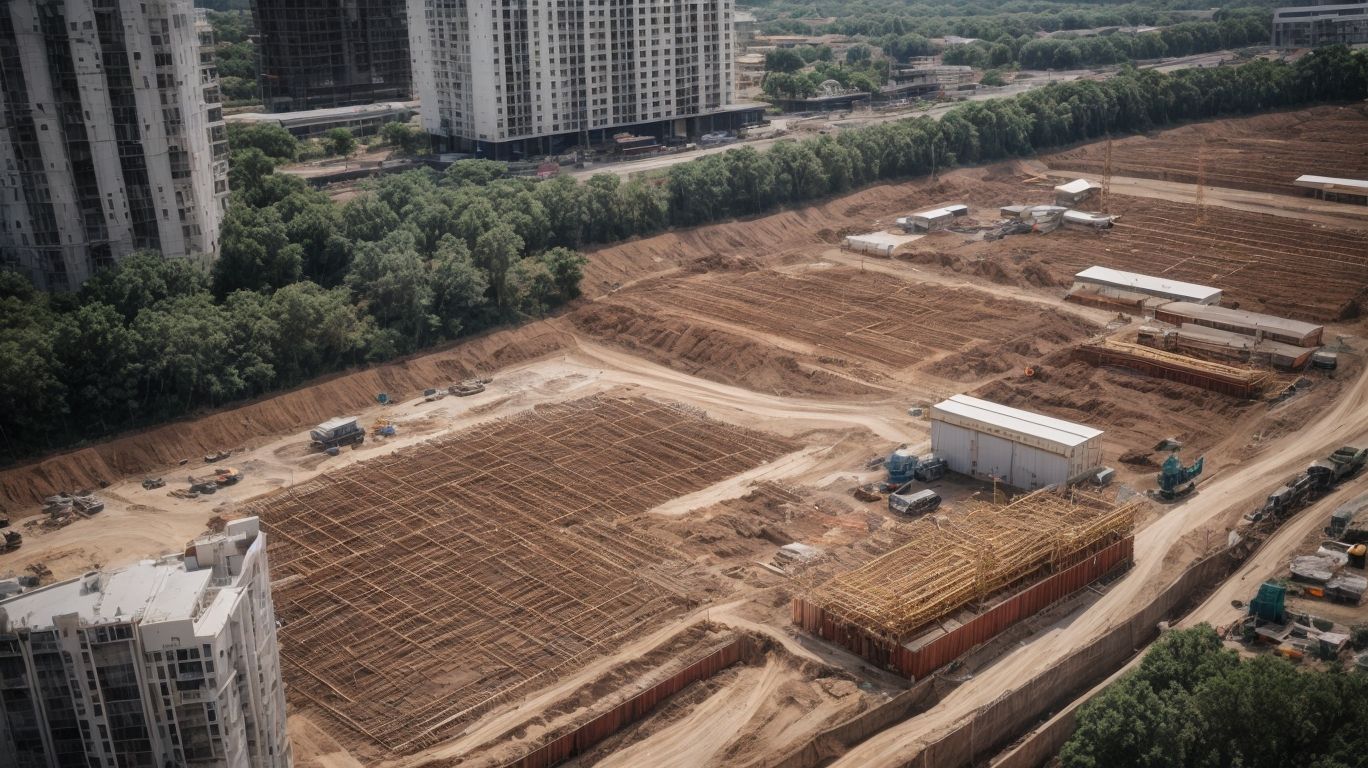
Are you considering becoming a property developer, but unsure of the potential challenges that lie ahead? This article will provide insight into the common hurdles that property developers face in their work. From navigating legal regulations to managing construction costs, this information will help you prepare for success in this competitive industry.
What Is Property Development?
Property development is the process of acquiring land or existing properties and enhancing or building structures on them for the purpose of sale or rental. It involves multiple phases, such as feasibility studies, obtaining financing, acquiring permits, designing, constructing, and promoting. The goal of property developers is to create profitable real estate ventures by identifying opportunities, mitigating risks, and meeting market demands. They must stay informed about market trends, regulations, and construction methods. Successful property development necessitates efficient planning, project management, financial analysis, and market research to guarantee the sustainability and prosperity of the development project.
What Are the Different Types of Property Development?
The field of property development encompasses a variety of projects, each with its own unique characteristics and purposes. Some of the most common types include:
- Residential development involves the construction of houses, apartments, or condominiums for residential purposes.
- Commercial development focuses on building office buildings, retail spaces, or hotels.
- Industrial development involves the creation of warehouses or factories.
- Mixed-use development combines different types of properties within a single project, such as a combination of commercial and residential spaces.
Understanding the various types of property development allows developers to specialize in specific areas or explore diverse opportunities based on market demands.
Pro-tip: Before deciding on a specific type of property development, it is important to conduct thorough market research to identify the demand and potential profitability of each sector. This will help inform your decisions and increase your chances of success.
What Are the Common Challenges Faced by Property Developers?
Property development is a highly lucrative but complex industry. As with any business, there are numerous challenges that property developers must face in order to successfully bring a project to fruition. In this section, we will discuss the common challenges that property developers encounter, from the initial stages of finding suitable land and securing financing, to the final stages of marketing and selling the property. Understanding these challenges is crucial for anyone considering a career in property development.
1. Finding Suitable Land
Finding suitable land for property development has always been a crucial step. In the 19th century, this task was even more daunting due to limited access to information and lack of infrastructure. Developers had to rely on local knowledge and personal connections to identify viable land options, often involving extensive travel and time-consuming negotiations. However, innovative developers persevered and played a crucial role in shaping the urban landscapes we see today. Here are some steps to consider when searching for suitable land:
- Identify target locations: Determine the areas where you want to develop properties based on market demand and potential profitability.
- Research property availability: Conduct thorough research to identify available land parcels in the target locations through online listings, real estate agents, and local government records.
- Evaluate land suitability: Assess the suitability of the land for your development plans, considering factors like zoning regulations, infrastructure availability, access to amenities, and potential environmental constraints.
- Financial feasibility: Analyze the cost of acquiring the land, along with development and construction expenses, to ensure the project remains financially viable.
- Negotiate purchase terms: Engage in negotiations with landowners or sellers to secure favorable purchase terms, such as price, payment schedules, and contingencies.
- Conduct due diligence: Before finalizing the purchase, conduct thorough due diligence, including land surveys, title searches, and environmental assessments, to uncover any potential issues.
- Secure necessary approvals: Initiate the process of obtaining necessary permits and approvals from local authorities to ensure compliance with regulations.
2. Securing Financing
Securing financing is a crucial step in property development. Here are some steps to help property developers secure financing:
- Assess financial needs: Determine the total funding required for the project, including land acquisition, construction costs, and other expenses.
- Prepare a solid business plan: Present a detailed business plan that outlines the project’s potential, profitability, and repayment plan.
- Research financing options: Explore various financing options such as bank loans, private lenders, crowdfunding, or partnerships.
- Build strong relationships: Cultivate relationships with lenders and investors by networking and showcasing a track record of successful projects.
- Prepare a comprehensive loan application: Gather all necessary documentation, including project details, financial statements, and feasibility studies.
- Negotiate loan terms: Negotiate favorable interest rates, repayment schedules, and collateral requirements to ensure the project’s financial viability.
By following these steps, property developers can increase their chances of securing financing for their projects.
3. Obtaining Necessary Permits and Approvals
Obtaining necessary permits and approvals is a crucial step in property development, ensuring compliance with local regulations and building codes. To successfully navigate this process, follow these steps:
- Identify the required permits and approvals for your specific project.
- Prepare all necessary documentation, such as architectural plans and environmental impact assessments.
- Submit your application to the relevant local authorities.
- Pay any applicable fees and wait for the review process to begin.
- Address any concerns or requests for additional information from the authorities promptly.
- Once approved, obtain the necessary permits and approvals.
Pro-tip: Engage professional consultants with experience in navigating the permit and approval process to ensure a smoother and more efficient outcome.
4. Managing Construction Costs
Managing construction costs is crucial for property developers to ensure profitability and project success. To effectively manage construction costs, here are some steps to follow:
- Conduct a thorough cost analysis before starting the project.
- Obtain multiple bids from contractors and suppliers to compare prices.
- Create a detailed budget and track expenses throughout the construction process.
- Implement cost-saving measures such as value engineering and efficient construction techniques.
- Regularly communicate with contractors to address any cost overruns and find solutions.
- Monitor and control material waste to reduce unnecessary expenses.
In addition, developers can also consider partnering with experienced contractors, negotiating favorable pricing, and utilizing technology to improve efficiency in order to further manage construction costs. By employing these strategies, property developers can minimize their expenses and maximize their return on investment.
5. Dealing with Unexpected Delays
Dealing with unexpected delays is a common challenge faced by property developers. To overcome this challenge, developers can take several steps:
- Plan for contingencies: Include buffer time in the project schedule to account for potential delays.
- Regular communication: Maintain open lines of communication with contractors, suppliers, and stakeholders to identify and address issues promptly.
- Effective project management: Implement efficient project management practices to closely monitor progress and identify any potential delays early on.
- Flexibility: Be prepared to adjust timelines and resources as needed to mitigate the impact of unexpected delays.
- Alternative options: Explore alternative solutions or approaches to keep the project on track, such as using different contractors or suppliers.
- Collaboration: Foster collaboration among all project stakeholders to find solutions collectively.
6. Marketing and Selling the Property
When it comes to marketing and selling property, property developers face numerous challenges. To navigate these hurdles successfully, developers can follow these steps:
- Research the target market to understand the needs and preferences of potential buyers.
- Create a comprehensive marketing strategy that includes both online and offline promotion, professional photography, and staging.
- Utilize various digital marketing platforms and social media to reach a wider audience.
- Build strong relationships with real estate agents and brokers to expand the reach of the property.
- Offer incentives or discounts to attract buyers, such as flexible payment options or additional amenities.
- Provide excellent customer service and communication throughout the sales process.
Fact: Effective marketing strategies can significantly impact the speed and success of property sales, ultimately maximizing profits for property developers.
How Can Property Developers Overcome These Challenges?
Property development can be a lucrative and rewarding industry, but it also comes with its fair share of challenges. In this section, we will discuss some of the common obstacles that property developers face and how they can overcome them. From conducting thorough research and building strong relationships, to creating a detailed project plan and staying adaptable, we will explore effective strategies for tackling these challenges head on. With the right approach, property developers can navigate these hurdles and achieve success in their projects.
1. Conduct Thorough Research and Due Diligence
Conducting thorough research and due diligence is crucial for property developers to ensure a successful project. Here are the steps to follow:
- Identify the target market and location: Research and analyze the market demand, demographics, and trends in the chosen location.
- Evaluate the property: Assess the property’s potential, zoning regulations, accessibility, and any legal or environmental issues.
- Financial analysis: Analyze the project’s financial feasibility, including costs, potential returns, and risks.
- Engage professionals: Seek expert advice from architects, engineers, lawyers, and consultants to assess the project’s viability.
- Assess competition: Study the competition in the area to understand market saturation and identify unique selling points.
- Review regulations: Understand and comply with all local, state, and national regulations and obtain necessary permits.
2. Build Strong Relationships with Lenders and Investors
Establishing strong relationships with lenders and investors is crucial for property developers to secure the necessary funding and support for their projects.
- Conduct thorough research to identify potential lenders and investors who specialize in property development.
- Attend industry events and networking functions to meet and connect with potential lenders and investors.
- Create a comprehensive business plan and financial projections to demonstrate the viability and profitability of your project.
- Showcase your past successful projects and track record to establish trust and credibility with lenders and investors.
- Maintain regular and transparent communication with lenders and investors, providing updates on project progress and promptly addressing any concerns or issues.
- Offer incentives or attractive investment opportunities to lenders and investors to encourage their involvement and support.
3. Hire Experienced Professionals and Consultants
To ensure successful property development, it is crucial to hire experienced professionals and consultants. Here are the steps to follow:
- Identify your project’s needs and goals.
- Research and compile a list of potential professionals and consultants.
- Interview the candidates and assess their experience and expertise.
- Check references and review their past projects.
- Select the best professionals and consultants based on their qualifications and fit for your project.
- Negotiate terms and contracts.
- Collaborate closely with the hired professionals throughout the development process.
- Regularly communicate, provide feedback, and address any issues that arise.
Fact: According to a study, projects involving experienced professionals and consultants have a higher success rate, with a 25% increase in profitability compared to those without professional guidance.
4. Create a Detailed Project Plan and Budget
Creating a detailed project plan and budget is crucial for property developers to ensure the successful execution of their projects. Here are the steps to follow:
- Define the project scope and objectives.
- Identify the key tasks and activities required for the project.
- Estimate the costs associated with each task, including materials, labor, and any additional expenses.
- Develop a timeline for the project, outlining the start and end dates for each task.
- Allocate resources effectively, considering the availability and skills of your team members.
- Create a budget that includes all estimated costs and monitor it throughout the project.
- Regularly review and update the project plan and budget as needed.
By following these steps, property developers can ensure that their projects are well-organized, financially viable, and completed within the allocated timeframe.
5. Stay Flexible and Adapt to Changes
Remaining flexible and adapting to changes is crucial for property developers to successfully navigate challenges and ensure project success. Here are some steps to help you stay flexible and adapt effectively:
- Regularly review and reassess project plans and budgets to accommodate unexpected changes.
- Stay updated with market trends and adjust strategies accordingly.
- Maintain open communication with stakeholders to address any new requirements or challenges.
- Implement agile project management techniques to quickly respond to changes and mitigate risks.
- Embrace innovative solutions and technologies that can enhance project efficiency and adaptability.
Pro-tip: Remember, being flexible doesn’t mean compromising on quality or vision; it means finding creative ways to overcome obstacles and optimize outcomes.
6. Utilize Effective Marketing and Sales Strategies
To successfully market and sell a property, property developers can implement the following strategies:
- Identify and target the appropriate audience for the property, considering factors such as location, amenities, and price range.
- Establish a strong brand image and message that resonates with the target market.
- Utilize various marketing channels, including online platforms, social media, print ads, and direct mail campaigns.
- Create visually appealing and informative marketing materials, such as brochures, virtual tours, and videos.
- Offer incentives or promotions to attract potential buyers, such as discounts, upgrades, or flexible financing options.
- Engage in networking and partnerships with real estate agents and brokers to increase exposure and reach.
- Host open houses or property showcases to allow potential buyers to experience the property firsthand.
- Provide exceptional customer service and promptly address any inquiries or concerns from interested buyers.
- Continuously analyze and adapt marketing strategies based on feedback and market trends.








